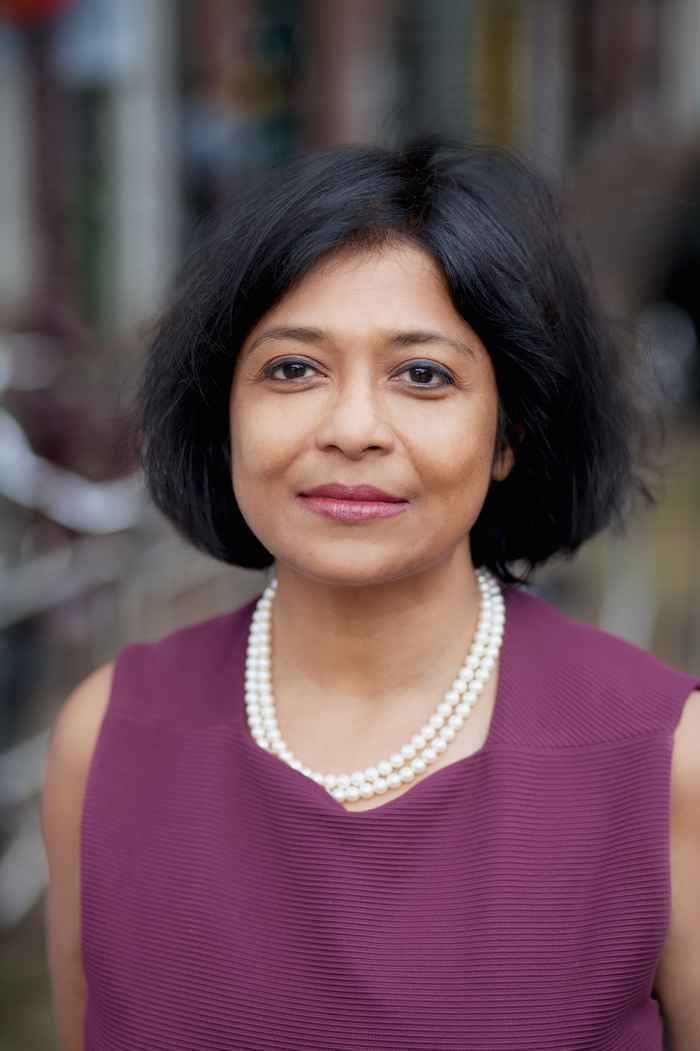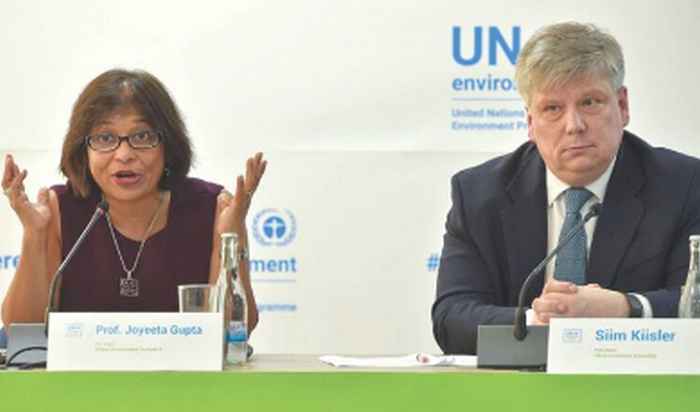Joyeeta Gupta: “What I could do at the UN? Maybe less than what I can do in a scientific paper, but at least I can push the political agenda forward.”
4 March 2024

Joyeeta Gupta chuckles at the irony that she, as a Professor of Environment and Development in the Global South, gets to represent the Global North in the 10-Member-Group. She feels privileged that they’ve chosen her, a ‘simple University Professor’, as she likes to call it, and seems to forget for a moment that she herself is a Nobel Prize laureate.
As of January 1st, 2024, Gupta is part of the second Ten-Member-Group, each with a two-year mandate. Its official name is the United Nations Group of Ten High-level Representatives of Civil Society, Private Sector, and Scientific Community to Promote Science, Technology, and Innovation for the SDGs. The members bring a diversity of expertise and experience across various fields of science, technology, innovation (STI), and business. They work closely with stakeholder groups, including businesses, youth and children, and the academic and research community.
“There is no alternative to the UN.”
Gupta knows her way around the UN and this relatively new initiative. It involves digesting a lot of abbreviations, but she is familiar with the UN bureaucracy and politics, knowing when to be careful with words like ‘degrowth’ and ‘global constitution for climate justice’. She mentions matter-of-factly that the Group should have been announced sometime last year, but this got delayed because some member states have not paid their dues. The Group members don’t get paid for their work, but this doesn’t stop Gupta from enthusiastically unfolding her plans for the coming years.
Gupta: “At our first online meeting, we brainstormed about a number of ideas. These ideas still need to be further decided upon, they focus on AI, climate change, the energy transition, platforms to promote the nexus between different goals, the need to promote women in science, and greater collaboration between scientists from different countries and disciplines.”
She hopes that the work from the Earth Commission on safe and just Earth System Boundaries can also help sharpen the environmental SDGs and that the work on the implications of these boundaries can help better articulate the social SDGs and the need for transformation. Initial meetings with the ambassadors chairing the STI meeting in February revealed the need for concrete suggestions of actions that can be sustainable and scaled up globally.
Gupta: “There is no alternative to the UN. It’s the only body today worldwide that is thinking also about poor countries. Some people believe that we must do it all at the local level. I think that is inadequate because nobody will take action that might affect their economy if everybody does not. You do need global regulation and you need a powerful entity at the global level. What I could do at the UN? Maybe less than what I can do in a scientific paper, but at least I can push the political agenda forward.”

“When you give the argument, the scientists will do the work for you.”
An illustration of this, Gupta explains, is the way she managed to push issues like social justice and equity forward when she was co-chair of UNEP’s Global Environment Outlook-6. Until then, UNEP was focussing on environmental issues only, although the SDGs were already formulated. Gupta: “The results were quite exciting because when you give the argument to the other scientists, including natural scientists, they will do the work for you. Then they will start looking at not just soil and land-related issues, but also at issues of land and water grabbing, not just at how many species will die because of dirty water, but how many people are dying or sick because of dirty water.”
She managed to do something similar as co-chair of the Earth Commission. Gupta: “We were looking at safe boundaries, and as social scientists we kept asking, is a safe boundary also a just boundary? And in the initial stages, the natural scientists came back and said to us, but isn't justice a normative issue? And so we had to think with them to convert justice into an issue that can be studied empirically and even quantitatively. So for example, the human right to water and energy we converted not only into 100 liters of water and/or three bulbs and a refrigerator, but we were also able to look at how much water and/or energy is needed for food production, energy production, cleaning water, building a small house, etc.”
“Let’s get our university, Amsterdam, and The Netherlands fossil-free as soon as possible.”
A topic that is on the agenda for the May meeting of the Science, Technology, and Innovation Forum in May in New York is Artificial Intelligence for the SDGs. The key question is when and under what conditions can AI actually address some of the challenges within the SDGs. For example, one can identify two types of problems: how does AI deal with science and fake news, and how does AI deal with the imbalance in knowledge between the global South and North?
Gupta is considering organizing a broad discussion at the Uva on this subject. Talking about the Uva, she doesn’t have to think twice about how she would spend the 1 million euros announced for a UvA-wide climate change program led by André Nollkaemper, director of the UvA Sustainability Platform (USP).
Gupta: “Let’s really look at how to get our university, Amsterdam, and The Netherlands fossil-free as soon as possible, taking into account scope 1 and scope 2 emissions and possibly even being honest about scope 3 emissions and financed emissions. This is urgent if we do not wish to miss the 1.5C target. Science must lead the way in showing what can and must be done.”
Under the umbrella of ENLENS, one of the UvA research priority areas, Gupta is researching the Port of Amsterdam. Gupta: “Amsterdam is talking about the doughnut economy and how well we spend our money, but Amsterdam also earns from projects that are not always wise. For example, Amsterdam is a shareholder in the Port of Amsterdam through which fossil fuels enter, which are then channelled to users such as Schiphol. It is critical to evaluate the role the Netherlands plays in helping corporations to avoid taxes since such money could be extremely important in addressing global climate change issues.”
“Quite an honor.”
Talking about making an impact as a scholar, Joyeeta Gupta stresses her strong belief in moving governments in the right direction. Sometimes she feels guilty that she has not been more politically active. Gupta: “But there is a limit to what you can do. So right now I feel quite happy that on the one hand, I can stand on the stage at Extinction Rebellion and support it in its effort to phase out fossil fuel subsidies in a just manner, and on the other hand be able to speak to the UN. Actually, it is quite an honor to have been selected for this position.”
-Elles Tukker
UvA Sustainability Platform (USP)